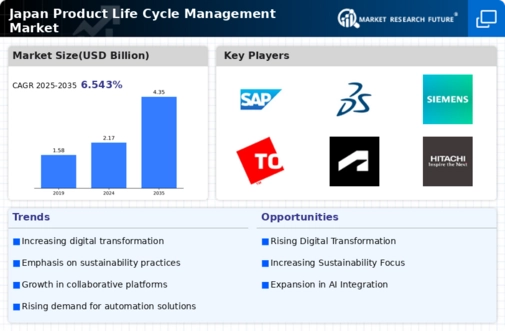Increased Regulatory Compliance
Japan's stringent regulatory environment significantly impacts the product life-cycle-management market. Companies are compelled to adhere to various regulations concerning product safety, environmental standards, and quality assurance. This regulatory landscape necessitates robust product life-cycle-management systems that can efficiently track compliance throughout the product's life cycle. In 2025, it is estimated that compliance-related investments will account for nearly 20% of total expenditures in the product life-cycle-management market. As organizations strive to meet these requirements, they are likely to adopt comprehensive solutions that streamline compliance processes, thereby enhancing operational efficiency and reducing risks associated with non-compliance.
Rising Demand for Customization
The product life-cycle-management market in Japan is experiencing a notable shift towards customization. As consumer preferences evolve, businesses are increasingly required to tailor products to meet specific needs. This trend is driven by the growing expectation for personalized experiences, which has led to a surge in demand for flexible product life-cycle-management solutions. In 2025, the market is projected to grow by approximately 15%, reflecting the necessity for companies to adapt their offerings. This customization trend compels organizations to invest in advanced product life-cycle-management tools that facilitate rapid adjustments throughout the product's life cycle, ensuring alignment with consumer expectations.
Focus on Supply Chain Optimization
Supply chain optimization is emerging as a crucial driver in the product life-cycle-management market in Japan. As companies seek to enhance efficiency and reduce costs, they are increasingly focusing on streamlining their supply chains. This trend is particularly relevant in the context of global competition, where agility and responsiveness are paramount. In 2025, it is anticipated that investments in supply chain management technologies will constitute around 25% of the overall product life-cycle-management market. By adopting integrated solutions that facilitate real-time monitoring and collaboration, organizations can improve their product life-cycle management processes, ultimately leading to better market responsiveness and customer satisfaction.
Growing Emphasis on Sustainability Practices
Sustainability is becoming a pivotal concern within the product life-cycle-management market in Japan. As environmental awareness rises among consumers and regulatory bodies, companies are increasingly adopting sustainable practices throughout the product life cycle. This shift is prompting organizations to invest in eco-friendly materials, energy-efficient processes, and waste reduction strategies. In 2025, it is projected that sustainability initiatives will drive approximately 30% of new investments in the product life-cycle-management market. By prioritizing sustainability, companies not only enhance their brand reputation but also align with consumer values, thereby gaining a competitive edge in the marketplace.
Technological Advancements in Data Analytics
The integration of advanced data analytics technologies is transforming the product life-cycle-management market in Japan. Companies are increasingly leveraging big data and artificial intelligence to gain insights into consumer behavior and market trends. This analytical capability allows businesses to make informed decisions at every stage of the product life cycle, from development to retirement. In 2025, the market for data-driven product life-cycle-management solutions is expected to grow by 18%, as organizations recognize the value of data in optimizing product performance and enhancing customer satisfaction. Consequently, the adoption of sophisticated analytics tools is becoming a critical driver for success in the product life-cycle-management market.






















Leave a Comment